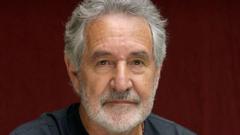As the world mourns the loss of Breyten Breytenbach, the esteemed South African writer and anti-apartheid activist, it reflects on his profound impact on literature and human rights. Breytenbach passed away peacefully at the age of 85 in Paris, surrounded by his wife, Yolande, a testament to a life dedicated to creativity, activism, and social justice.
Born on September 16, 1939, in the Western Cape, Breytenbach gained international acclaim not only as a poet and novelist but also as a painter whose art often conveyed themes of captivity and struggle. Throughout his life, he remained a fierce critic of the apartheid regime that dominated South Africa for decades. His family's announcement pointed out, "an immense artist, militant against apartheid, he fought for a better world until the end."
Educated at the University of Cape Town, Breytenbach was part of a literary group called the Sestigers, who aimed to explore the beauty of the Afrikaans language, while also critiquing the racist policies governing their nation. Despite the language's ties to the oppressive apartheid regime, Breytenbach held it close but rejected its association with the Afrikaner political identity, leading him into self-imposed exile in 1960.
While living in Europe, he maintained a critique of apartheid, ultimately making a clandestine return to South Africa in 1975. Unfortunately, his activism led to a seven-year prison sentence for terrorism, during which he continued to write poetry that would define his legacy. His most notable work, "The True Confessions of an Albino Terrorist," chronicles the realities of his imprisonment.
In the years following his release, facilitated by then-French President François Mitterrand, Breytenbach continued to voice his concerns about injustices in South Africa, criticizing the ruling African National Congress (ANC) for corruption. His activism extended beyond national borders; in 2002, he publicly addressed the Israeli Prime Minister regarding the Palestinian conflict, demonstrating his commitment to human rights globally.
With over 50 published works, Breytenbach's literary contributions include poetry, prose, and essays translated into various languages, showcasing his intellect and artistic prowess. He received numerous accolades, including being made a Knight of the Order of Arts and Letters in France.
Breytenbach leaves behind his beloved wife, daughter, and two grandsons, along with a legacy that proves the power of art and literature in fighting tyranny and advocating for a just world. His journey reflects the human spirit's resilience and the impact one voice can have in challenging injustice, making him a poignant figure in both South Africa's history and global human rights advocacy.
Born on September 16, 1939, in the Western Cape, Breytenbach gained international acclaim not only as a poet and novelist but also as a painter whose art often conveyed themes of captivity and struggle. Throughout his life, he remained a fierce critic of the apartheid regime that dominated South Africa for decades. His family's announcement pointed out, "an immense artist, militant against apartheid, he fought for a better world until the end."
Educated at the University of Cape Town, Breytenbach was part of a literary group called the Sestigers, who aimed to explore the beauty of the Afrikaans language, while also critiquing the racist policies governing their nation. Despite the language's ties to the oppressive apartheid regime, Breytenbach held it close but rejected its association with the Afrikaner political identity, leading him into self-imposed exile in 1960.
While living in Europe, he maintained a critique of apartheid, ultimately making a clandestine return to South Africa in 1975. Unfortunately, his activism led to a seven-year prison sentence for terrorism, during which he continued to write poetry that would define his legacy. His most notable work, "The True Confessions of an Albino Terrorist," chronicles the realities of his imprisonment.
In the years following his release, facilitated by then-French President François Mitterrand, Breytenbach continued to voice his concerns about injustices in South Africa, criticizing the ruling African National Congress (ANC) for corruption. His activism extended beyond national borders; in 2002, he publicly addressed the Israeli Prime Minister regarding the Palestinian conflict, demonstrating his commitment to human rights globally.
With over 50 published works, Breytenbach's literary contributions include poetry, prose, and essays translated into various languages, showcasing his intellect and artistic prowess. He received numerous accolades, including being made a Knight of the Order of Arts and Letters in France.
Breytenbach leaves behind his beloved wife, daughter, and two grandsons, along with a legacy that proves the power of art and literature in fighting tyranny and advocating for a just world. His journey reflects the human spirit's resilience and the impact one voice can have in challenging injustice, making him a poignant figure in both South Africa's history and global human rights advocacy.


















